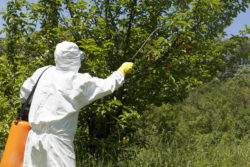Top Class Actions’s website and social media posts use affiliate links. If you make a purchase using such links, we may receive a commission, but it will not result in any additional charges to you. Please review our Affiliate Link Disclosure for more information.

To support their cause, the Environmental Working Group (EWG) and a variety of companies specialized in marketing organic whole foods such as Ben & Jerry’s Homemade Inc., Happy Family Organics, MegaFood, MOM’s Organic Market, National Co-op Grocers, Nature’s Path Foods Inc., One Degree Organic Foods USA Inc., and Stonyfield Farms Inc. purportedly included with their petition glyphosate herbicide residue testing from several oat products. These products included granola, other cold cereals, snack bars, and quick-cooking and instant oatmeal.
The EWG and associated companies claim that the EPA’s currently accepted level of 30 ppm on oats is too high and presents a clear and present danger to children, according to the Feedstuffs article. They are hopeful that reducing the tolerated amount with this crop will reduce children’s overall exposure to the harmful chemicals and protect them from health risks.
IARC and EPA at Odds
The EWG quotes the arm of the World Health Organization (WHO) known as the International Agency for Research on Cancer (IARC) in their assessment of glyphosate as a ‘probable human carcinogen’. Glyphosate is the key ingredient in Monsanto’s Roundup herbicide. Monsanto retains its name, but was recently purchased by the Bayer Co.
After an IARC review of substantive scientific evidence in March 2015, a panel of 17 experts from 11 different countries came to the conclusion—as previously indicated by EWG—glyphosate was a ‘probable human carcinogen’. According to the IARC website, four other organophosphate insecticides and herbicides were also evaluated at the time and included diazinon, malathion, parathion, and tetrachlorvinphos.
The basis for this determination by IARC was the review of about 1,000 studies, some of which actually looked at cancer rates among those exposed to glyphosate in the course of their occupations. The participants in the review were independent and had no special interest in the outcome of the evaluation one way or the other. The panel allegedly employed strict scientific criteria and a classification system respected globally.
The EPA has a substantially different viewpoint on the controversial herbicide. As indicated in a post on EPA’s website on April 30, 2019, the federal agency continues to claim that glyphosate is by no means carcinogenic to humans.
In fact, it maintains that when the herbicide is used according to its label, it doesn’t impose any unnecessary burdens on human anatomy. That said, the EPA has determined that there are ecological consequences for glyphosate herbicide use.
The agency has set up guidelines that encourage focused use on problematic pests as well as protective measures that help ensure the preservation of pollinators. These guidelines are also intended to discourage such wanton use of the herbicide that weeds become tolerant and application must be ramped up to have the same effect.
The petition submitted by EWG has received comments from other organizations. The National Association of Wheat Growers (NAWG) and the North American Millers Association (NAMA) have encouraged the EPA to turn down the petition because residues were so far beneath the acceptable level of the agency. They indicate that intake would have to be significantly increased to be a problem, according to the assessment of the governmental body.
If you or a loved one developed cancer after using Roundup as a farm worker or home gardener, you may have a legal claim. Legal migrant farm workers may also seek help. Learn more by filling out the form on this page for a FREE case evaluation.
ATTORNEY ADVERTISING
Top Class Actions is a Proud Member of the American Bar Association
LEGAL INFORMATION IS NOT LEGAL ADVICE
Top Class Actions Legal Statement
©2008 – 2024 Top Class Actions® LLC
Various Trademarks held by their respective owners
This website is not intended for viewing or usage by European Union citizens.
Get Help – It’s Free
Join a Free Roundup Cancer Class Action Lawsuit Investigation
For the most up-to-date information on this case, click here.












